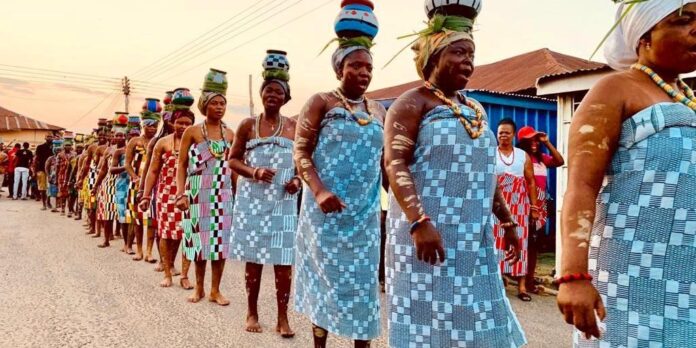The More-Educated Than His Ancestors, the Metha, has occupied leadership posts and he leads his nations into what can only be properly described as the bottom. The bottom of everything. You name it.
The Metha is an outspoken neoliberal Christian, not because he chose to become one. That religion was spoon-fed to him in a colonial missionary boarding school paid for by the villages. Since his graduation, he has been unable to unshackle his mind, soul and spirit from the contradictions of his cultural orientation and his new position in the continued, colonial, missionary exploitation of the village.
Why is the Metha incapable of wresting away his mind and memory from the dogmatism of neoliberal Christianity?
Some one hundred or so years ago, beyond the gated colonial communities of Accra, Ghana, for instance, one would be remiss to not find on the compound home of many of the Ga people there, the Amaga. The Amaga occupied the center of the house and commanded all attention.
Elsewhere, in other communities, the Amaga flanked the main entrance to the compound of the Ancestral Home. The more prominent the Amaga, the more prominent the house, or the clan, or the family. Libations were regularly poured to the Amaga and the family was required to gather around the Amaga for such essential occasions as the outdooring of a newborn.
The Amaga is nowhere to be found today. The Amaga has been replaced with something totally sinister—an Italian male image called Jesus, on the walls of the Metha’s bedroom. I point this out as the most prominent distortion of the vital component of the African memory and our understanding of self, time and memory. Memory does not only reside in our minds—it exists beyond the mind.
The replacement of the Amaga with the colonial print-image of a European terrorist in Africa inverts the mind of the Metha. This massive divergence in many African societies led by the Metha is not simply religious or cultural. It is not even simply about the exploitation of the resources—although that is the entire point of European colonial terrorism.
However, this divergence in the African mind, especially in the mind of the Metha leadership, marks the conflict between the Metha-west and the rest of Africa, and it is the result of the Metha falling into the worship and deification of destructive behavior. This nihilism is a negation of the reality of the African memory—although it purports to have religion, it does not have any.
The end result is that the Metha is religious, but he no longer has any trace of religion left in him, only the human being is left, empty and unable to fetch a cogent and intact copy of his own memory. The Metha is, after all, an empty vessel used, and abused like a Useful Idiot, by the colonial, missionary, terrorist European forces to continue in the summary exploitation and looting of the village. The Metha cannot have or keep friends, only fellow pirates. The Metha is incapable of loyalty and for this reason he is afraid of the disloyalty of his gang. There’s no honor amongst thieves.
The Metha leadership gang, therefore, and its western backers, simply have no clue how much the rest of Africa rejects the value system of their contemporary globalist neo-liberalism—the celebration of sexual depravity (or Orgasmatron Politics), the over-simplification of differences, which paradoxically does not serve to legitimize broader perspectives, but rather introduces a brand new dogmatism that is seriously impervious to rational discourse, and insists that it must enforce the debased (re-)formulations of trans-humanist ideology.
The rest of us reject these things! We reject the utter dogmatism of it all. We are reminded that it is not difficult to appreciate the village, if one could bring himself to understand it as a straightforwardly integrated union. The village offers a more holistic perspective—one which can account for, rather than annul or strike out, the variability within the fabric of our culture and heritage—because the village has not lost the African memory. The village does not contend with the severe contradictions that the Metha daily suffers. The village, unlike the Metha, can and will resurge the consciousness needed to trigger a recall to the Amaga past.










